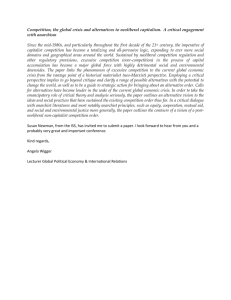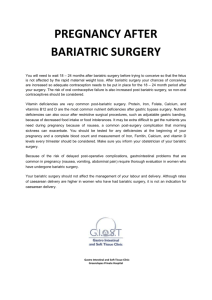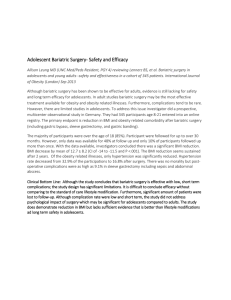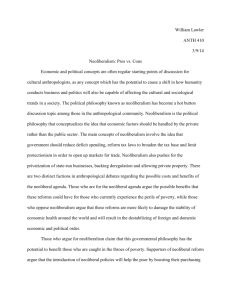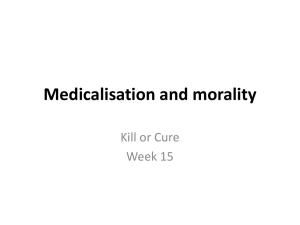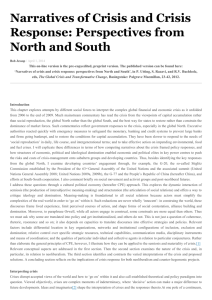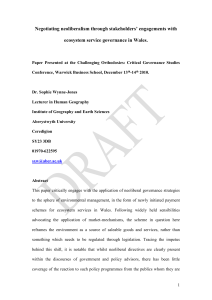Estranged Bodies – Discussion notes
advertisement
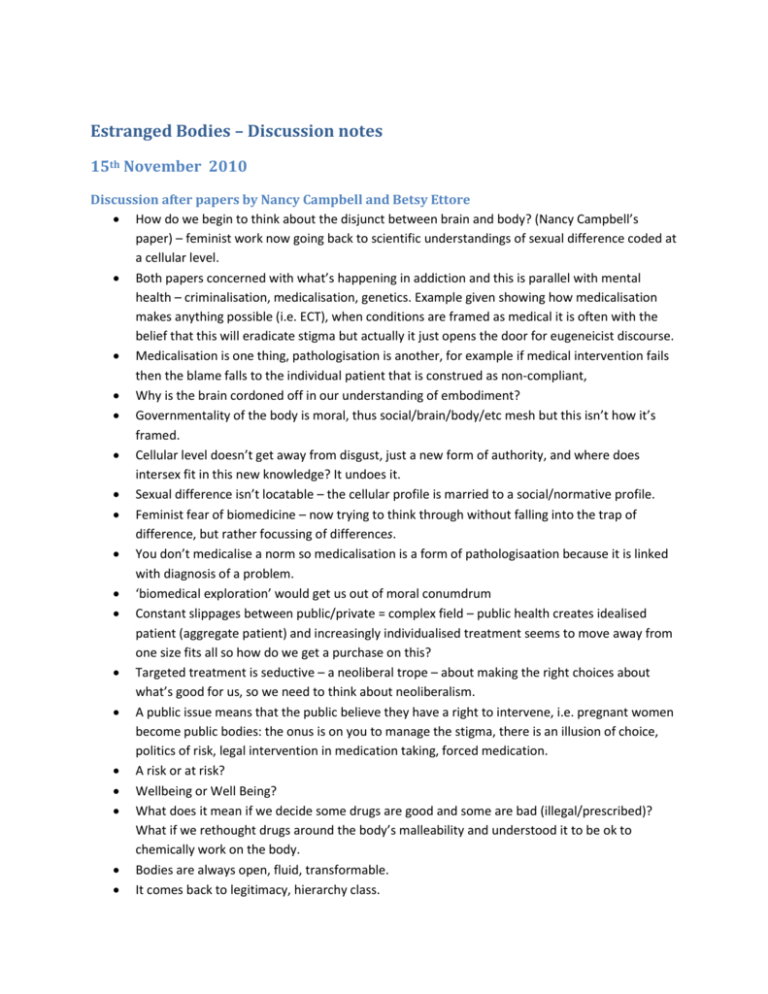
Estranged Bodies – Discussion notes 15th November 2010 Discussion after papers by Nancy Campbell and Betsy Ettore How do we begin to think about the disjunct between brain and body? (Nancy Campbell’s paper) – feminist work now going back to scientific understandings of sexual difference coded at a cellular level. Both papers concerned with what’s happening in addiction and this is parallel with mental health – criminalisation, medicalisation, genetics. Example given showing how medicalisation makes anything possible (i.e. ECT), when conditions are framed as medical it is often with the belief that this will eradicate stigma but actually it just opens the door for eugeneicist discourse. Medicalisation is one thing, pathologisation is another, for example if medical intervention fails then the blame falls to the individual patient that is construed as non-compliant, Why is the brain cordoned off in our understanding of embodiment? Governmentality of the body is moral, thus social/brain/body/etc mesh but this isn’t how it’s framed. Cellular level doesn’t get away from disgust, just a new form of authority, and where does intersex fit in this new knowledge? It undoes it. Sexual difference isn’t locatable – the cellular profile is married to a social/normative profile. Feminist fear of biomedicine – now trying to think through without falling into the trap of difference, but rather focussing of differences. You don’t medicalise a norm so medicalisation is a form of pathologisaation because it is linked with diagnosis of a problem. ‘biomedical exploration’ would get us out of moral conumdrum Constant slippages between public/private = complex field – public health creates idealised patient (aggregate patient) and increasingly individualised treatment seems to move away from one size fits all so how do we get a purchase on this? Targeted treatment is seductive – a neoliberal trope – about making the right choices about what’s good for us, so we need to think about neoliberalism. A public issue means that the public believe they have a right to intervene, i.e. pregnant women become public bodies: the onus is on you to manage the stigma, there is an illusion of choice, politics of risk, legal intervention in medication taking, forced medication. A risk or at risk? Wellbeing or Well Being? What does it mean if we decide some drugs are good and some are bad (illegal/prescribed)? What if we rethought drugs around the body’s malleability and understood it to be ok to chemically work on the body. Bodies are always open, fluid, transformable. It comes back to legitimacy, hierarchy class. Responsibility, the subject + neoliberalism, the way the law is implemented, questions around where the body’s limits are. Reference to Hilary Graham’s work on mothers smoking as a resource. Is neoliberal subject an antidote to the idea of a public body? Discussion after Azrini Wahidin and Kay Inckle People appreciated narrative form of Kay’s presentation The locus of moral entitlement – judging the behaviour of others translates into the treatment and (de)legitimation of behaviour Disassociation – position of recovery of the self – estrangement from the self not necessarily disempowerment (Wahidin) Strategies of disassociation in doctors’ working practices – the psychology of this needs to be taken seriously, it is a violence but an endless experience that can be damaging in itself. Coping strategies Treatment doesn’t meet complex need, service predefined ideas of who they treat. Discussed Kay’s methods. Bad treatment such as not using anaesthetic negates humanity and is a form of punishment. But why?! Discussants expressed feels of futility in face of these problems. In neoliberal subjectivity illhealth becomes the negation of humanity, and to care for someone therefore becomes problemative. The first act of disassociations is to protect our own vulnerability, i.e. Tom Shakespeare argues that this is what disablism arises from. Nobody wants to talk about these things. It is problematic to separate out health from illness Disability has nothing to do with health/illness, this understanding arises from a sick body being non-normative and an impaired body being non-normative. The medical relationship between people is impossible and this is the sickness – the dehumanising technologies like uniforms and hospital gowns that fragment relationality and distribute vulnerability. Example of Magrit’s study with heart surgeons and their patients – surgeons devastated by patient’s stories of less than desirable experience of heart transplant. How is there a way to function – this relationship relies on the surgeons not knowing. Can you escape pathologising structures of medicine? Comparison between medicine and religion – both acts of faith. Technological competency is not wellbeing, wellbeing is subjective. Asking shameful questions – why isn’t it ok to refuse chemotherapy? What about empathetic sisterhood? Women’s health movement had idea that all women are essentially caring – this is a problematic universal. Care is complex WHM was about sameness, user-led standpointism. Neoliberal subjectivity is dutiful rather than sovereign, autonomy is an illusion. The cutter in Kay’s paper never says anything, there is power in her silence, but you can’t have silence as a normative academic text. 16th November 2010 Discussion after Deborah Steinberg and Sam Murray Difference between neoliberal subject (cancer patient who appears to be in control) and failed neoliberal subject (bariatric surgery patient using this intervention as last option, failure as currency into the programme) and how they are both really the same. Temporality and future – a disavowal of the present for a different future. Denial of death = denial of humanity Redemption and transcendence – what’s happening to these in neoliberalism? Mobilisation of belieg, eventually your pathway to recovery will reveal itself and you must recognise it – resonance with many forms of transformation. Patient responsibility absolves the medic; when it goes wrong you are bad, devious, misbehaving patients Bariatric surgery is devisive – love it or hate it. The side-effects are a trade off for becoming visible and de-stigmatised. Parallels with other surgical transformation but you have to be a particular type of failure to become a success story after bariatric surgery. Success stories are about retrieving something from the wreckage of a violent and ongoing trauma. You are not told about the ongoing issues, you are told about a rosy future that will fix the unbearable present. This is a fantasy of agency This is the fantasy of normative embodiment fulfilled Marketing medicine Failed neoliberal subject is a passive woman told to sit there quietly and be fixed. Fat is intelligible as failure – so success is all about ‘look at me’ Going for bariatric surgery is a Foucaultian confessional space = admit that you are fat and that you have failed to become thin What is health anyway? We’ve lost touch with this question, moral complexity has overridden the issue. Health is mobilised as monolithic universal concept but it isn’t one. Maybe we need to think about wellbeing and well Being Being unexceptional and fitting in is linked to wellbeing (ref Kathy Davis article about why women have cosmetic surgery) Addiction and appetite – the metabolic theory of addiction is about how the lack of feeling satiated, whole and satisfied after eating is linked to addiction – people who can’t be satiated often become drug addicts. This links with a deep brain therapy offered to people who have had bariatric surgery which hasn’t worked. Basically this is retraining the brain to experience pleasure and satiety the ‘right’ way. The plasticity of the brain, Neuroscience as experimental, enacting a passive object to which anything can be done. Bariatric surgery conflate obesity and over eating We need a new cultural imaginary that reject notions of wholeness and coherence of a healthy body or wellbeing but accepts partiality and leakiness Our bodies fragment all the time These new ideas of health and wellbeing use language of intersubjectivity but maintains a selfauthoring subject. What should we do about feminist holistic utopian recovery narrative? We need to reclaim the word flourishing from neoliberal medical discourse.
